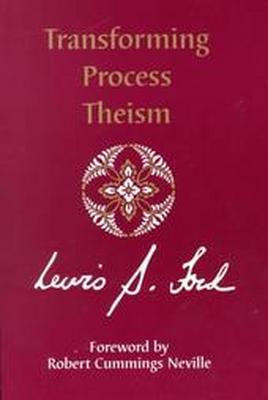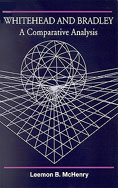
AnthonyFlood.com
Panentheism. Revisionism. Anarchocapitalism.


A review of Leemon McHenry, Whitehead and Bradley: A Comparative Analysis, Albany: State University of New York Press, 1992, as published in The Review of Metaphysics, 1993, 46:3, 630-633.
Whitehead and Bradley:
A Comparative Analysis
Lewis S. Ford
Whitehead and Bradley both constructed philosophies of experience based upon feeling, in opposition to theories of scientific materialism (particularly in Whitehead's case). For Bradley reality is ultimately timeless, while for Whitehead reality is process. In the end Whitehead thought his philosophy could be understood as a transformation of absolute idealism in terms of the realities of process. He did not start out thinking this, although the affinities between idealism and process is greatest in the original version of Science and the Modern World (1925). The underlying substantial activity, particularly as characterized by its modes, the definite events of the world, could be considered as a dynamic, temporalized conception of the all-inclusive Absolute. Bradley's Wolf-eating-Lamb as a qualification of the Absolute could be seen as a particular event constituting one mode of the substantial activity, despite Whitehead's later emphatic objections (see Process and Reality [Free Press, 1978], 43).
Yet Whitehead never accorded the underlying substantial activity a preeminent reality which denigrated the reality of the modes. He embraced monism at this time only because he could not find any adequate individuating principle for events short of the whole. All this changed when he adopted temporal atomicity. Now the individual occasions were the fundamental actualities, and the underlying substantial activity faded into the background as the abstract formative element of creativity. His thought became concretely pluralistic as he sought to understand the nature of passage for these actual occasions.
Even when Whitehead found it necessary to introduce God in the form of a nontemporal actuality, it was not identified with the underlying substantial activity, which alone could be considered all inclusive. At first he was even obligated to think of God as the third attribute of that activity. This timeless actuality was originally conceived as an exceedingly abstract principle limiting eternal objects to those capable of actualization, and later conceived as their timeless synthesis. Thus it is safe to say that during most of the composition of Process and Reality Whitehead would have rejected the Absolute out of hand, for the effort to conceive of a single inclusive Reality appears to undercut the reality of passage and time.
What neither he nor any one else seems to have anticipated is the possibility of transforming the concept of an all-inclusive Absolute along temporalistic lines, in terms of the consequent nature. This concept does not appear to have been based so much on a renewed appropriation of Bradley as on internal issues concerning Whitehead's own systematic. He seems to have asked himself, What would happen if God as the concrescence of all conceptual feelings were conceived to have physical feelings of all actualities as well? This concept worked well, for Whitehead could now appropriate Bradley's Absolute by transforming it temporally.
Leemon McHenry's book is a careful, responsible study setting out to do precisely what is required by its title. The two thinkers are compared on such topics as experience (and consciousness), internal and external relations, extension (whole-part relations), time, and God.
While Whitehead may have adopted "feeling" from Bradley to express a more inclusive subjective category than thought or emotion or sensation, he fit it into a framework determined by prehensive relationships. Bradley, on the other hand, seems to have adopted feeling from Hegel as "the vague continuum below relations" (p. 12). Whitehead may be here offering a pluralistic version of this monism of feeling, since connections among the many need to be conceived as relations, and these relations would be feelings.
Bradley's strict monism ultimately precludes any relations at all, but this can be understood as the intensification of internal relations. Certainly it is quite distant from any theory of external relations. Whitehead's theory of prehension is a pluralistic version of internal relations, the many being held apart in that some of the terms are held apart by external relations.
There is really only one point in the analysis of Whitehead's theory that requires further comment, and that concerns the tricky issue of "perishing." McHenry presents T. L. S. Sprigge's objections to Whitehead's theory of time, from Sprigge's The Vindication of Absolute Idealism (1983). If, in Sprigge's words, the occasion has "suffered a kind of sea-change" by losing subjective immediacy, how is it identical with itself? (p. 145). McHenry takes this to be the problem of how diverse perspectives can be identical with the one reality experienced; for the being perishes insofar as its impact upon successors is fragmentary and partial. This is clearly one of Whitehead's meanings (Process and Reality, 340), for it is this perishing of being that is overcome by its inclusion within the consequent nature.
Yet this is a general problem for all realistic epistemologies. I suspect Sprigge was asking a different question, one closer to Whitehead's particular theory: How can a being be identical with its former self, now that it has lost subjective immediacy? In one sense, it cannot, because now it is a being, whereas formerly it was becoming. But that is precisely the nature of self-creation. Then the question becomes, How can an objective being be identical with its subjective becoming? For the elaborate metaphor of subjective perishing in the attainment of objective immortality is designed to explain how the shift from subject to object is not a shift from one kind of being to another, but from one temporal aspect to another.
Note, however, that this is not the perishing of being Whitehead talks about in the context of the consequent nature. For it is by the perishing of (subjective) becoming that being is attained. A fortiori it is not the complete perishing of being, for it is only by the perishing of becoming that any being can come to be.
In McHenry's final assessment, Bradley's theory is judged to be consistent but, one senses, inadequate; Whitehead's account is more adequate, but inconsistent, largely because God does not exemplify all the metaphysical principles (pp. 164-5). Yet it is enough that God be an actual entity; this need not mean that God is an exception because the consequent concrescence cannot reach final unity. On the other hand, there are real problems concerning God's interaction with the world. McHenry proposes to overcome this difficulty by having smaller internal satisfactions within the overarching consequent concrescence (pp. 167ff). This would make good sense were it fundamentally a part-whole problem. But becoming is an all-inclusive undertaking, whether in actual occasions or God: no being is attained until there is final unity, which for the divine becoming will never come.